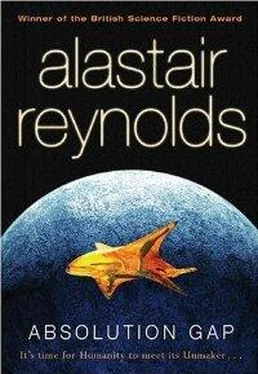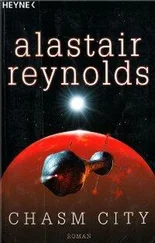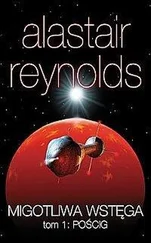“I’m disappointed, all the same,” Quaiche said. “I’d hoped you would want to share it with me. The spectacle won’t be anywhere near as impressive from a distance.”
“I don’t doubt that for a moment,” Vasko said. “All the same, we’ll leave you in peace to enjoy it first-hand.” He looked at Khouri, choosing his words carefully. “We wouldn’t want to interfere with a sacred event.”
“You wouldn’t be interfering,” the dean said. “All the same, if that’s what you wish… I can hardly stop you. But we’re still twelve hours from the crossing. There’s no need to get nervous just yet.”
“Are you nervous?” Khouri asked him.
“Not in the slightest,” he said. “That bridge was put there for a reason. I’ve always believed that.”
“There’s the wreckage of another cathedral at the bottom of the rift,” Vasko said. “Doesn’t that worry you at all?”
“It tells me that the dean of that cathedral lacked faith,” Quaiche said.
Vasko’s communicator chimed. He lifted the bracelet to his ear, listened carefully. He frowned, then turned and whispered something into Khouri’s ear.
“Something the matter?” Quaiche asked.
“There’s some trouble on the ship,” Vasko said. “I’m not sure exactly what it is, but it seems to have something to do with your delegates.”
“My delegates? Why would they be causing trouble?”
“It seems they’re trying to take over the ship,” Vasko said. “You wouldn’t know anything about that, would you?”
“Well, now that you mention it—” Quaiche made a very poor imitation of a smile “—I might have an inkling.”
One of the doors to the garret swung open. Six red-uniformed Adventist guards walked in, carrying weapons and looking as if they knew what to do with them.
“I’m sorry it’s come to this,” Quaiche said, as the guards motioned for Vasko and Khouri to sit down opposite Rash-mika. “But I really need your ship, and—let’s be honest—there was never much chance of you just giving it to me, was there?”
“But we had an agreement,” Vasko said, one of the guards prodding him on the shoulder. “We offered you protection.”
“The trouble was, it wasn’t protection I was after,” Quaiche said. The rim of his eye-opener flashed polished brass. “It was propulsion.”
Rashmika had a premonitory sense that something was about to trespass into her head. In the moments before the shadows spoke to her, she had learned to identify a specific sensation: a faint tingle of neural intrusion, like the feeling that somewhere in a huge and rambling old house a door had just opened.
She steeled herself: aware of the proximity of the scrimshaw suit, conscious of the ease with which the shadows were able to slip in and out of her skull.
But the voice was different this time.
[Rashmika. Listen to me. Don’t react. Don’t pay any more attention to me than you would to a stranger.]
Rashmika shaped an answer, without speaking. It was as if she had been born to it, as if the skill had always been there. Who are you ?
[I’m the only other woman in this room.]
Despite herself, Rashmika glanced towards Khouri. The woman’s face was impassive: not hostile, not even unkind, but utterly blank of any kind of expression. It was as if she were looking at a wall, rather than Rashmika.
You?
[Me, Rashmika. Yes.]
Why are you here?
[To help you. How much do you remember? All of it, or only some of it? Do you remember anything at all?]
Aloud, Vasko said, “Propulsion, Dean? Are you saying you want our ship to take you somewhere?”
“Not exactly, no,” Quaiche replied.
Rashmika tried not to look at the woman, keeping her attention focused on the men instead. I don’t remember much, only that I don’t belong here. The shadows already found me out. Do you know about the shadows, Khouri ?
[A little. Not as much as you.]
Can you answer any of my questions? Who sent me here? What was I supposed to do?
[We sent you here.] In her peripheral vision Rashmika saw the woman’s head nod by the slightest of degrees: silent, discreet affirmation that it was really her voice Rashmika was hearing. [But it was your decision. Nine years ago, Rashmika, you told us we had to put you on Hela, in the care of another family.]
Why?
[To learn things, to find out as much as you could about Hela and the scuttlers, from the inside. To reach the dean.]
Why?
[Because the dean was the only way of reaching Haldora. We thought Haldora was the key: the only route to the shadows. We didn’t know he’d already used it. You told us that, Rashmika. You found the short cut.]
The suit?
[That’s what we came for. And you, of course.]
Whatever your plan was, it’s going wrong. We’re in trouble, aren’t we?
[You’re safe, Rashmika. He doesn’t know you have anything to do with us.]
If he finds out?
[We’ll protect you. I’ll protect you, no matter what happens. You have my word on that.]
She looked into the woman’s face, daring Quaiche to notice. Why would you care about me ?
[Because I’m your mother.]
Look into my eyes. Say it again.
Khouri did. And though Rashmika watched her face intently for the slightest indication of a lie, there was none. She supposed that meant Khouri was telling the truth.
There was shock, a stinging sense of denial, but it was not nearly as great as Rashmika might have expected. She had, by then, already begun to doubt much of what passed for her assumed history. The shadows—and, of course, Surgeon-General Grelier—had already convinced her that she had not been born on Hela, and that the people in the Vigrid badlands could not be her real parents. So what remained was a void waiting to be filled with facts, rather than one truth waiting to be displaced by another.
So here it was. There was still much she needed to remember for herself, but the essence was this: she was an agent of Ultras— these Ultras, specifically—and she had been put on Hela on an intelligence-gathering mission. Her actual memories had been suppressed, and in their place she had a series of vague, generic snapshots of early life on Hela. They were like a theatrical backdrop: convincing enough to pass muster provided they were not the object of attention themselves. But when the shadows had told her about her false past, she had seen the early memories for what they were.
The woman said she was Rashmika’s mother. She had no reason to doubt her—her face had conveyed no indication of a lie, and Rashmika already knew that her supposed mother in the badlands was only a foster parent. She felt sadness, a sense of loss, but no sense of betrayal.
She shaped a thought. I think you must be my mother .
[Do you remember me?]
I don’t know. A little. I remember someone like you, I think.
[What was I doing?]
You were standing in a palace of ice. You were crying.
Hela Orbit, 2727
Ribbons of grey-blue smoke twisted in the corridor, writhing with the shifts of air pressure. Fluid sluiced from weeping wounds in the walls and ceiling, raining down in muddy curtains. From some nearby part of the ship, Captain Seyfarth heard shouts and the rattle of automatic slug-guns, punctuated by the occasional bark of an energy weapon. He stepped through an obstacle course of bodies, his booted feet squashing limbs and heads into the ankle-deep muck that seemed to flood every level of the ship. One gauntleted hand gripped the rough handle of a throwing knife formed from the armour he had been wearing upon his arrival. The knife was already bloodied—by Seyfarth’s estimate he had killed three Ultras so far, and left another two with serious injuries—but he was still looking for something better. As he passed each body he kicked it over, checking the hands and belt for something promising. All he needed was a slug-gun.
Читать дальше












